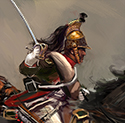gradenko2k
Posts: 935
Joined: 12/27/2010
Status: offline

|
To quote a lesson from Sid Meier:
Do Your Research After The Game Is Done
Many of the most successful games of all time - SimCity, Grand Theft Auto, Civilization, Rollercoaster Tycoon, The Sims - have real-world themes, which broadens their potential audience by building the gameplay around concepts familiar to everyone.
However, creating a game about a real topic can lead to a natural but dangerous tendency to cram the product full of bits of trivia and obscure knowledge to show off the amount of research the designer has done. This tendency spoils the very reason why real-world themes are so valuable - that players come to the game with all the knowledge they already need.
Everybody knows that gunpowder is good for a strong military, that police stations reduce crime, and that carjacking is very illegal. As Sid puts it, "the player shouldn’t have to read the same books the designer has read in order to be able to play."
Games still have great potential to educate, just not in the ways that many educators expect. While designers should still be careful not to include anything factually incorrect, the value of an interactive experience is the interplay of simple concepts, not the inclusion of numerous facts and figures.
Many remember that the world’s earliest civilizations sprang up along river valleys -- the Nile, the Tigris/Euphrates, the Indus -- but nothing gets that concept across as effectively as a few simple rules in Civilization governing which tiles produce the most food during the early stages of agriculture. Furthermore, once the core work is done, research can be a very valuable way to flesh out a game’s depth, perhaps with historical scenarios, flavor text, or graphical details. Just remember that learning a new game is an intimidating experience, so don’t throw away the advantages of an approachable topic by expecting the player to already know all the details when the game starts.
=====
So to relate this to the topic, perhaps the question one should be asking oneself is, does this operational-level game involve making decisions relevant to an operational-level commander?
Are you calculating force allocation across the front? Are you worrying about having picked the right spot for force concentration? Is logistics a prime concern for you? Is maintaining proper command-and-control a challenge?
As long as the game is hitting those notes, I think it's very arguable that the game is realistic enough.
|
 Printable Version
Printable Version














 New Messages
New Messages No New Messages
No New Messages Hot Topic w/ New Messages
Hot Topic w/ New Messages Hot Topic w/o New Messages
Hot Topic w/o New Messages Locked w/ New Messages
Locked w/ New Messages Locked w/o New Messages
Locked w/o New Messages Post New Thread
Post New Thread